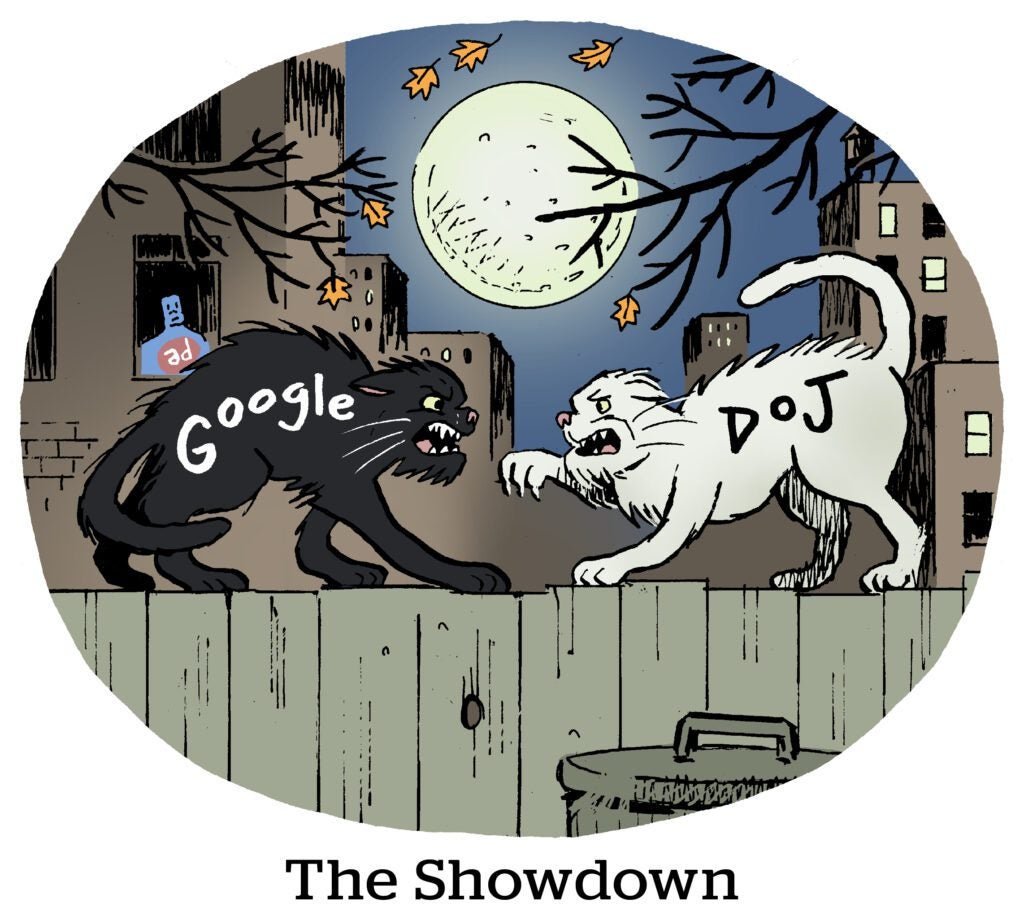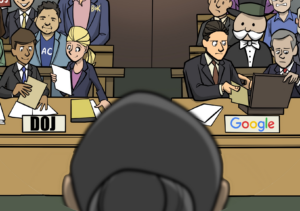Google may get a lump of coal from the government this year.
(Sometimes the lede writes itself.)
In September, Google went on trial to face allegations that it operates an illegal monopoly over the online advertising industry.
Google defended itself over three weeks in an Alexandria, Virginia courtroom presided over by federal Judge Leonie Brinkema, whose job it now is to decide (her ruling is expected early next year) whether Google used its market power to stifle competition and maintain its dominance.
The Department of Justice says, “Uh, yeah.”
Google says, “Nah.”
If you want more specific information about their arguments, listen to this podcast with our guest Arielle Garcia, director of intelligence at Check My Ads, who moved to Alexandria for the duration of the trial to track proceedings in the courtroom every day. 🎙️
AdExchanger was there, too, sitting in the gallery for the first week of testimony and furiously scribbling notes with a pencil in a spiral notebook, since no electronics or recording devices of any kind are allowed in the courtroom.
As the ad industry awaits Judge Brinkema’s decision, get up to speed with AdExchanger’s in-depth coverage.
The countdown begins …
Thanks To The DOJ, We Now Know What Google Really Thought About Header Bidding
There’s nothing like the trove of evidence that gets unsealed during a court case.
Although certain documents made public in US v. Google were heavily redacted and other evidence remained under seal until the trial began, there were still thousands of pages of depositions, court-filed declarations, internal emails and messages to trawl – including lots of juicy tidbits.
Like this nugget from a 2015 internal Google presentation about DFP: “Without first look,” Google wrote, “we are left with inventory that other buyers have had a look into and didn’t want to pay for.”
Yep, first look was a big advantage!
Google Is Fighting To Keep Ad Tech Execs Off the Stand In Its Upcoming Antitrust Trial
Roughly two weeks before the trial started on September 9, Google filed a motion to exclude testimony about its alleged anticompetitive behavior coming from witnesses who aren’t economists or antitrust experts.
If Google had been successful, folks like Index Exchange CEO Andrew Casale, former AppNexis CEO Brian O’Kelley and Kevel CEO James Avery would have been prevented from taking the stand or having their depositions read aloud in court.
Google’s motion was dismissed on September 4.
Project Cheat Sheet: A Rundown On All Of Google’s Secret Internal Projects, As Revealed By The DOJ
What do Hercule Poirot, Ben Bernanke, Star Wars and C.S. Lewis have in common?
If you’re an ad tech nerd, you’ll know the answer immediately.
They all served as inspiration for the code names associated with different internal Google projects, including several related to Google’s header bidding countermeasures. Many were first revealed within the DOJ’s original complaint against Google.
 The trial begins …
The trial begins …
AdExchanger attended the first week of the trial in person in Alexandria, and we have the writing callouses to prove it.
One of our readers wrote to us to say that our daily missives from the courtroom were “the next best thing to actually being there.”
So, pop some popcorn and relive the action:
- Your Day One Recap: DOJ vs. Google Goes Deep Into The Ad Tech Weeds
- The DOJ vs. Google, Day Two: Tales From The Underbelly Of Ad Tech
- DOJ vs. Google, Your Day Three Download: A Former Googler On The Stand And Auction Dynamics In The Spotlight
- DOJ vs. Google, Day Four: Behind The Scenes On The Fraught Rollout Of Unified Pricing Rules
- DOJ vs. Google, Day Five Rewind: Prebid Reality Check, Unfair Rev Share And Jedi Blue (Sorta)
Publishers Feel Seen At The Google Ad Tech Antitrust Trial
This trial, meanwhile, was like a collective catharsis for publishers, and all of the pubs AdExchanger spoke with said they felt vindicated – but far from shocked – by revelations on the stand.
“I wish I was more surprised by any of these emails and excerpts,” Justin Wohl, CRO of Snopes.com and TV Tropes, told AdExchanger. “The experience of working with Google’s advantage for nearly 10 years now conditioned me to expect this in its entirety.”
Buried DOJ Evidence Reveals How Google Dealt With The Trade Desk
Although the trial focused on Google’s supply-side business and its publisher ad server, the DOJ also unearthed evidence that painted a new picture of how Google interacts and competes with its main DSP rival, The Trade Desk.
For example, consider this 2020 email exchange between Sissie Hsiao, then Google’s VP of display, video and app advertising, and a Google colleague in which she recounts a conversation she had with Dave Pickles, The Trade Desk’s then CTO.
Hsiao had asked Pickles for his perspective on what it’s like working with Chrome engineers, to which he apparently responded: “The PMs at Chrome are drunk with power.”
Spicy Quotes You’ll Be Quoting From The Google Ad Tech Antitrust Trial
The trial itself was also full of zingers. Read this piece for a list of some of the most notable quotables from the three weeks of testimony, including this one:
In 2019, Stephanie Layser, now with AWS, was VP of ad tech at News Corp. At the time, she wrote an email to Google asking for a meeting to talk over her deep concerns about the rollout of unified pricing rules. At the meeting, which was with two female Google employees, she was told she was being “emotional and unproductive.”
 And now we wait …
And now we wait …
The Google Ad Tech Antitrust Case Is Over – And Here’s What’s Happening Next
Google rested its defense on September 30 and the case was over, just three weeks after it began.
Both sides were given until November 4 to submit their revised findings of fact, which is a legal document that outlines the material facts in a case.
Closing arguments were scheduled for right before the Thanksgiving break on November 25.
What Was It Like Testifying In The Google Ad Tech Antitrust Trial? We Asked Kevel’s CEO
In this Q&A, James Avery, CEO and founder of Kevel (previously Adzerk), reflects on his experience of testifying during the trial. He took the stand on Day One.
“I never thought I’d have a chance to really say my piece like this,” Avery told AdExchanger.
Adzerk had tried – and failed – to compete with Google in the ad server market. The company later rebranded to Kevel and was forced to pivot its business model away from the open web and into retail media.
Google And The DOJ Recap Their Cases In The Countdown To Closing Arguments
Google and the government submitted their respective findings of fact on November 4, as planned, which included detailed retellings of the case that summarize the evidence and allegations.
These documents are one more tool that Judge Brinkema will use as reference as she makes her decision.
What Judge Brinkema Zeroed In On During Closing Arguments In US v. Google
And on November 25, attorneys from both sides were given 90 minutes apiece to make their final case to Judge Brinkema before she retired to mull the evidence and write her ruling.
The judge had the opportunity to interrupt and ask questions throughout closing arguments – and she had some great ones.
At one point, she interrupted Karen Dunn, Google’s lead attorney, who was in the midst of explaining why a certain 2018 Supreme Court decision, Ohio v. Amex, also applies in this case.
In Ohio v. Amex, SCOTUS found that a court in an antitrust case must consider the network effects that arise from a transaction. Ad tech tools, Dunn argued, operate in a single, two-sided marketplace with buyers on one side and sellers on the other. Conduct might end up looking anticompetitive when one only considers the impact on a single party, which is what Google said the DOJ did in only focusing on publishers.
Judge Brinkema didn’t appear convinced, though. She said she’d liked the Amex argument at first, but had become less convinced over time of its relevance here.
“I’ve read the Amex case more times than I probably should’ve,” she said. “Early in the case it felt very attractive … but now it seems to me we’re dealing with a completely different setup.”
And now we await her decision, which is expected early next year.
🎙️ So, that was a lot, but if you somehow haven’t had enough yet, warm up those AirPods. We’ve got podcasts, too.
- An Interview With A Star Witness In The Ad Tech Trial Of The Century (Guest: Andrew Casale, CEO & president, Index Exchange)
- Adam Heimlich, Ad Tech Time Traveler
- Ari Paparo, On The Ground In Virginia
- The Case For Turning Google’s Network Biz Into A Nonprofit, with Arete Research’s Richard Kramer
- Talking (Antitrust) Turkey With DCN’s Jason Kint



















